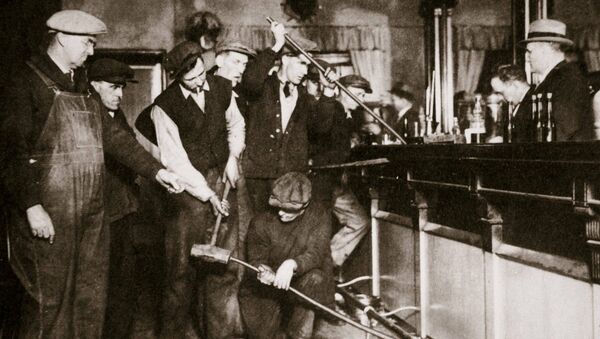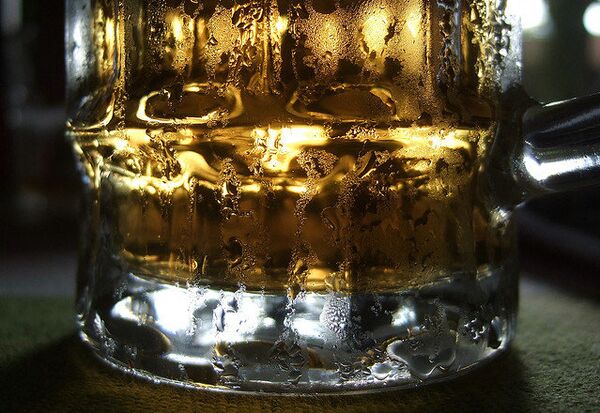But there were plenty of people who disapproved of the effects of alcohol and, in 1826, some of them banded together to form the American Temperance Society, which attracted 1.5 million members within 12 years, quickly gaining a level of cultural clout that could not be ignored.
An even stronger response to the perception of the alcohol-related downfall of American society was found in the 1893 creation of the Ohio-based Anti-Saloon League. Taking an active part in US politics, the league lobbied for federal legislation to prohibit production and consumption of alcohol and initiated several local referendums, many of which produced desired results. By 1910, 40 of Illinois' 102 counties and 1,059 of the state's townships and precincts had become alcohol-free, at least outside of the home.
On August 1, 1917, the US Senate, under heavy pressure from religious, business and government leaders, passed the 18th Amendment to the United States Constitution, prohibiting production and sale of all alcoholic beverages. In the historic passage of a doomed amendment the Anti-Saloon League was instrumental, coordinating its efforts with multiple local and national like-minded groups. The amendment stipulated that "the manufacture, sale, or transportation of intoxicating liquors within, the importation thereof into, or the exportation thereof from the United States and all the territory subject to the jurisdiction thereof for beverage purposes is hereby prohibited." Liquors considered "intoxicating" included all beverages with more than 0.5 percent alcohol by volume. In one stroke, the United States government had, perhaps with an air of supercilious puritanism, outlawed all wine, beer, cider, and distilled liquors. The Amendment, though over-reaching, did not reach far enough, failing to establish any liabilities in the event of a violation.
Still riding the wave of the amendment's passage, the US Congress passed the 1919 Volstead Act to provide for actual penalties in the event of a proven violation of the 18th Amendment. The Act was intended to penalize alcohol producers and distributors, rather than consumers.
On January 17, 1920, after a long delay, the 18th Amendment and the Volstead Act were ratified. The new legislation quickly led to the organization of large-scale criminal groups engaged in bootlegging, a generic term for the illegal manufacture, distribution and sale of alcohol. The prohibition of alcohol triggered widespread corruption among government employees, civil servants, judges, police, lawyers and politicians, all eager to cash in on the desire by most of society to engage in a time-honored pastime dating back thousands of years.
During the 1928 presidential campaign, the prohibition protest, born only hours after ratification of the 18th Amendment, grew to a point at which many who did not drink, and some who disapproved of its use by others, supported its repeal. Incoming President Herbert Hoover, a Republican and rumored to be a man who enjoyed good whiskey responsibly, immediately ordered an investigation into the consequences of prohibition. The Wickersham Commission entered into the debate, did its research and promptly recommended an immediate end to prohibition enforcement.
Incoming Democratic President Franklin Roosevelt tabled and won in 1933 the repeal of the 18th Amendment with the passing of the 21st Amendment. The new amendment gave all states the responsibility to legislate the sale and production of alcohol.
In retrospect, the adoption and subsequent rejection of prohibition has been argued by some to have been beneficial to the country. For the first time, a personal issue had changed from a private problem to a public attitude, driving alcoholism and its effects beyond mere hand-wringing and editorializing. Organizers used high-pressure lobbying tactics to achieve results unthinkable to an earlier age more circumspect in the consideration of a citizen's private life.
One of the more obvious problems in making an almost universal behavior illegal is the rise of the black market. The risk, gain and birth of an alternate currency and culture, all bound up in giving people what they so obviously want, allowed for an unstoppable criminal business model. The organized criminal culture of the era became a powerful force. Distribution groups were estimated to collect over $3 billion annually from alcohol manufacture, distribution and sale. The courts became swamped as the number of alcohol-related crimes rose. The criminal justice system did not have the resources to process those arrested. And, in an insult to the injury of any still supporting prohibition, alcohol consumption in 1933 was estimated to be 20 percent higher than in 1919. Concurrently, the use of narcotic substances in the US was estimated to have increased by around 45 percent in the 13 years between enactment and repeal.
The 18th Amendment is, to date, the only amendment to the United States Constitution to be repealed in its entirety.




